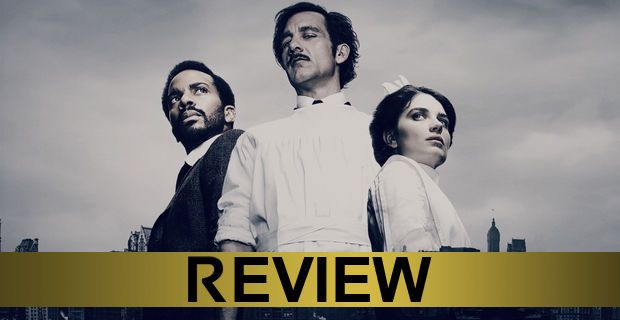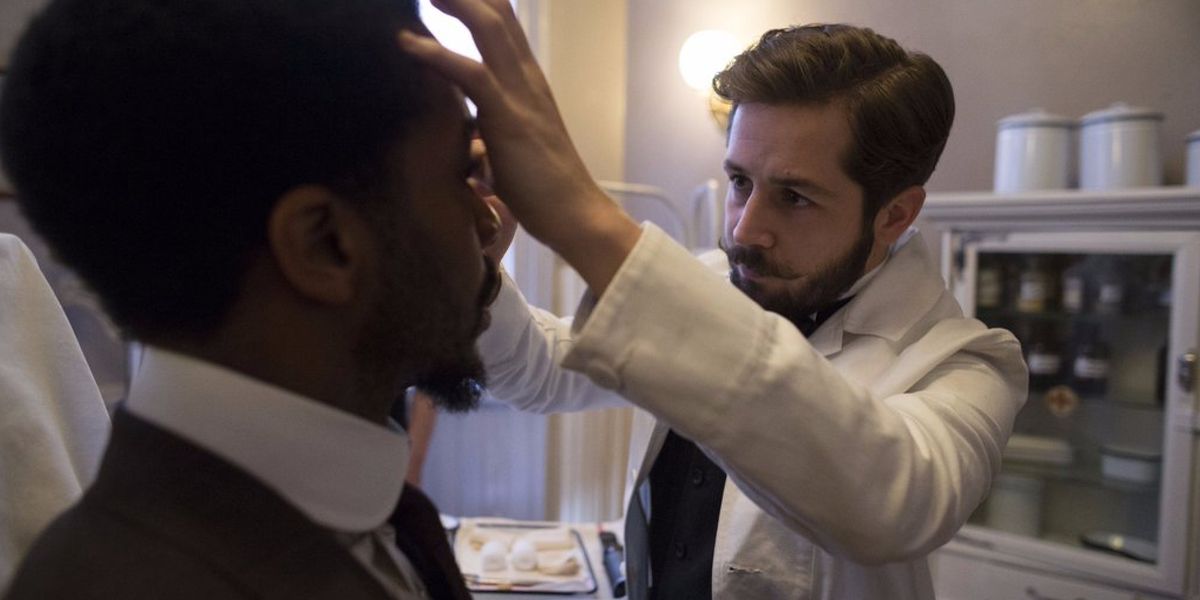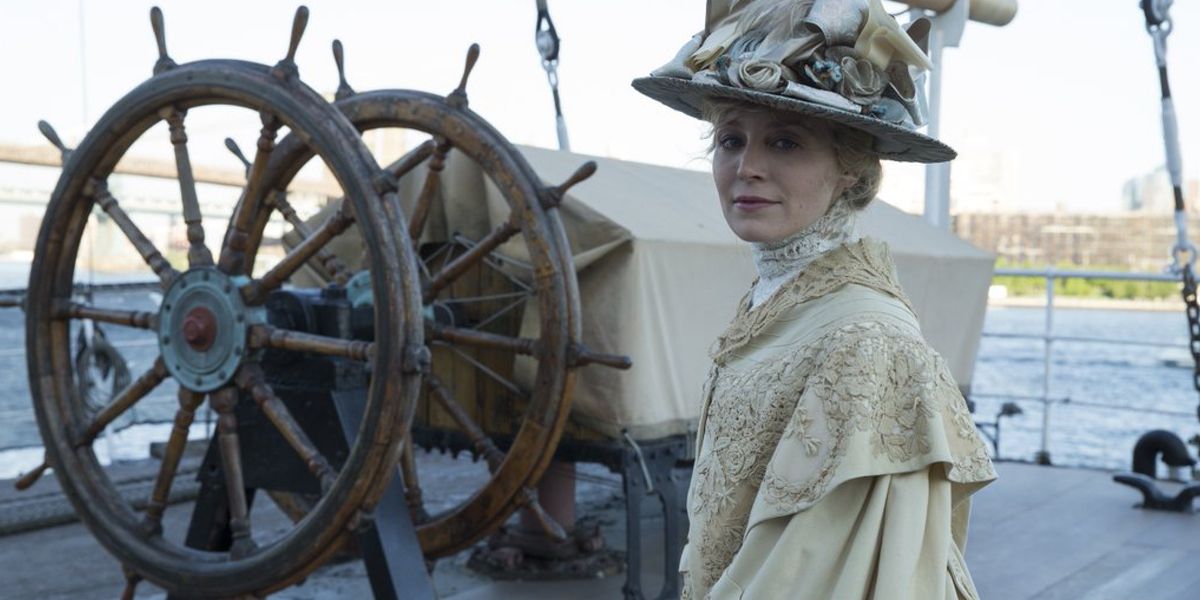[This is a review of The Knick season 2, episode 10. There will be SPOILERS.]
-
Of all that transpires in 'This Is All We Are,' the season 2 finale of The Knick, the most indelible moment is that edit. You know the one; it's late in the episode and Thackery, high on cocaine and his own surgical prowess, performs a risky self-surgery in order to repair his ischemic bowels and simultaneously prove the superiority of his cocaine epidural over the more widely used and accepted ether. Thackery, ever the showman, is less surgeon and medial pioneer here than he is carnival barker and sideshow attraction rolled into one. He even narrates his way through the extreme blood loss he suffers as a result of accidentally slicing his aorta. So, when Thack slips into unconsciousness and the camera follows Bertie, as he darts through the halls of the Knick to retrieve a bottle of adrenaline, every single white-shoed footstep feels like an eternity. Back in the theater, Bertie hastily plunges a syringe into Thack's heart and that cut is made.
It is a jarring edit, and an expertly made one at that. The scene cuts to the surgical theater after some time has passed – could be the very same day, or it could be several days later. The theater is quiet, pristine, almost as though no surgery had ever taken place there, let alone the spectacle that had just gone horribly, inevitably wrong. The false serenity of the shot amplifies the urgency of everything that just transpired and the ambiguity of what follows. You can't help but return to that edit in your mind in the hope of somehow seeing around or beyond the snip.
There is more to the finale, of course, and most of it has to do with characters arriving at a turning point in their lives. But the way that late-episode edit stands out, remains fixed as the turning point in the hour (and maybe even the series), speaks to the nature of The Knick and how the show is, above all else, a showcase of direction, editing, and cinematography – all of which is handled by Steven Soderbergh. From that distinct moment on, the hour feels blinkered; Soderbergh deliberately restricts what the audience can see. This is fitting as it focuses primarily on André Holland's Dr. Algernon Edwards, his career as a surgeon likely over due his own limited vision. But it is also indicative of the power of ambiguity in those final moments, and how the artistry of their composition, the implication that an answer lies somewhere in the periphery, actually becomes the narrative, becomes more prevalent than even the question of Thack's fate.
The finale is stacked with questions like that. From Thackery to the weight of Tom Cleary's confession to the marks on Barrow's hands and his girlfriend having control of his estate, so much is left unanswered. While these questions are engaging, inasmuch as their being posed hints at the idea there is more to come, the hammer-like quality with which some are presented points to the schism between the sometimes-unsteady narrative and occasionally inelegant dialogue and the proficiency with which the final product is actually composed. This has always been a defining characteristic of The Knick; the arresting skillfulness of its composition and performances often feel distinctly removed from the unevenness of the writing. That has been especially true during this second season, the diffuse narrative of which seemed at times to suffer from the potentially deadly malady known as sophomoritis.
Season 2 began by picking up the pieces of season 1, showing Thackery, Edwards, and everyone else having been scattered, displaced. The narrative brought the characters back to the series' eponymous setting, but it never quite managed to make it feel as though they were part of the same story. Cornelia was off investigating Speight's death and an outbreak of the plague, while Bertie was back and forth between hospitals. Gallinger's despicable racism found a purpose in his endorsement of eugenics, while Lucy discovered how to wield her sexuality. Some of these elements, like Lucy's journey, defined the characters in new and interesting ways. Others, however, like Barrow's profiting off the construction of the new Knickerbocker Hospital, Edwards' heretofore-unseen wife appearing unannounced, or the many, many lines of dialogue underlining the miracle of hindsight felt conspicuously like blunt instruments in a series where everything else was scalpel sharp.
Mostly, though, it comes back to the idea that the distinct story threads, while offering many characters a chance to standout, only did so on occasion, and the overarching narrative sometimes came up short as a result of their inconsistencies. Still, thanks in large part to Soderbergh's visual compositions and inventive editing techniques, The Knick proved resilient and managed to stave off the worst of its onset sophomoritis. This is made evident in the finale, which elevated moments like Cleary's confession by remaining outside the confessional, fixated on the guilty man's feet sticking out from behind the curtain. Or by hinting at Henry's capacity to murder his own sister, before fixing the camera on the steps below him, remaining stationary as Lucy entered the scene and ascended to an elevated station above Cornelia.
These visual inferences elevate The Knick, too; they point to the power of insinuation and how it works in concert with the ambiguity of the final moments of 'This Is All We Are.' Given the somberness of Edwards' tone, there is reason to believe Thackery is dead. If he isn't, Edwards could simply be mourning the death of Thackery's career, which would almost certainly have ended that day in the operating theater. Then again, Algernon may be mourning the demise of his own time as a surgeon, taking up "the talking cure" by saying he owes Thackery that much.
As such, if this is the end of The Knick (as Clive Owen has suggested was the original intent) or simply the end of season 2, it at least manages to bring the focus around – albeit obliquely – to Thackery and Edwards, to once again demonstrate their significance to the series and its principal narrative, ongoing or otherwise. Although the storytelling of season 2 may not have had the vitality of season 1, this dark, ambiguous finale highlights the vigor with which the series has always been composed.
-
Screen Rant will keep you updated with the status of The Knick, as information is made available.



